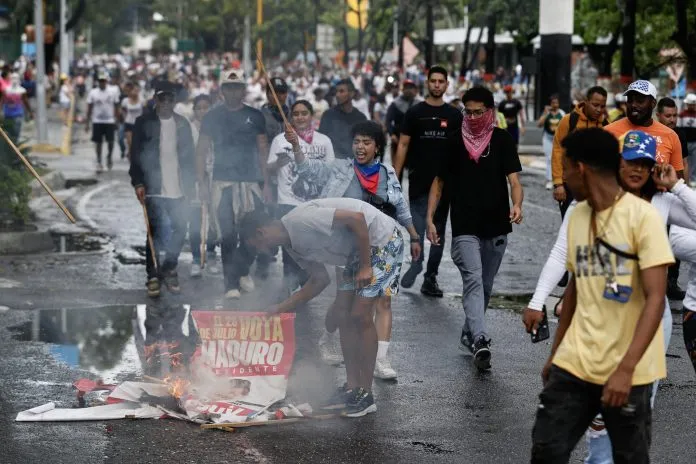Overview of the July 29th Protests in Venezuela
On July 29, Venezuela witnessed widespread and spontaneous protests in response to the recent presidential election results announced by the National Electoral Council (CNE). The demonstrations, which spanned nearly every state in the country, reflected a deep-seated discontent among the Venezuelan populace. The protests were driven by claims that the election results did not accurately represent the will of the majority of Venezuelans who cast their votes on election day.
Fatalities and Casualties
According to the NGO Foro Penal, which specializes in the defense of political prisoners, at least six individuals lost their lives during the protests that occurred on the afternoon and evening of July 29. These fatalities were reported across various regions of Venezuela. Additionally, the National Hospital Survey reported a higher number, indicating eleven deaths, though this figure has not been independently verified.
The scale of the protests and the violence associated with them highlighted the intensity of the public’s reaction to the electoral results. The unrest was characterized by clashes between protesters and security forces, with reports of violent confrontations contributing to the death toll.
Detailed Reports from Affected Regions
Zulia State: Two Fatalities
In Zulia, a tragic incident occurred when a 15-year-old adolescent, identified as Isaías Fuenmayor, was shot in the neck during a protest on Avenida 40 in the municipality of San Francisco. The incident happened near the Eduardo Mathias Lossada High School. Local reports suggest that armed motorcyclists attacked the protest, resulting in Fuenmayor being gravely injured. Despite being rushed to the Dr. Adolfo Noriega Trigo Hospital, he was pronounced dead upon arrival.
Ildanis Sierra, a local councilman, confirmed Fuenmayor’s death via social media and condemned the regional and municipal police for their alleged role in permitting the violence. Another fatality in Zulia, identified only by the initials G.R., was reported by Foro Penal, though details surrounding this individual’s death remain unclear.
Maracay: Death of Rancés Yzarra
In Maracay, Aragua State, Rancés Yzarra, a 30-year-old man, was killed while participating in a protest near the Redoma de San Jacinto. Yzarra was struck by a projectile and, despite being transported to the Central Hospital of Maracay, was pronounced dead upon arrival. Eyewitnesses, including a neighbor who spoke to Efecto Cocuyo, indicated that Yzarra’s death was a result of the violent clashes between protesters and security forces.
In addition to Yzarra’s death, reports emerged of journalist Jesús Romero from the media outlet Código Urbe being injured while covering the protest, highlighting the dangers faced by reporters in such volatile situations.
Yaracuy and Táchira: Three Additional Deaths
In Yaracuy, two young individuals, identified as A.P. (16 years old) and J.A.G. (19 years old), were reported dead following the protests. In Táchira, a 40-year-old man known by the initials J.V. was also confirmed dead. The violence in these states underscored the widespread nature of the unrest and the severe impact on local communities.
Detentions and Repression
The protests also saw a significant number of detentions across various states. Foro Penal reported that at least 132 individuals were detained during the protests on July 29. The breakdown of detentions by state includes:
- Barinas: 18 detainees
- Anzoátegui: 10 detainees
- Distrito Capital: 48 detainees
- Aragua: 15 detainees
- Zulia: 19 detainees
- Carabobo: 4 detainees
- La Guaira: 3 detainees
- Lara: 2 detainees
- Mérida: 3 detainees
- Miranda: 3 detainees
- Trujillo: 2 detainees
- Yaracuy: 2 detainees
- Monagas: 1 detainee
- Portuguesa: 1 detainee
- Táchira: 1 detainee
Reactions and International Responses
The eruption of protests and the associated violence reflect deep-seated frustrations with the electoral process and the perceived lack of transparency. The opposition, led by María Corina Machado, has asserted that they possess over 73% of the voting records, which they believe would demonstrate a clear victory for their candidate, Edmundo González Urrutia, over Nicolás Maduro.
Machado’s claims are based on their analysis of the election data, suggesting that Maduro received 2,259,256 votes compared to González Urrutia’s 6,275,182. These figures underscore the significant discrepancy between the reported official results and the opposition’s findings.
Conclusion
The protests of July 29 have highlighted the volatile political climate in Venezuela and the widespread dissatisfaction with the electoral process. The tragic loss of life and the large number of detentions underscore the intensity of the public’s reaction and the challenges faced by both protesters and authorities in managing the situation.
The situation remains fluid, with ongoing protests and a continuing debate over the legitimacy of the election results. The international community and local observers will likely keep a close eye on developments in the coming days, as efforts to address the crisis continue.


